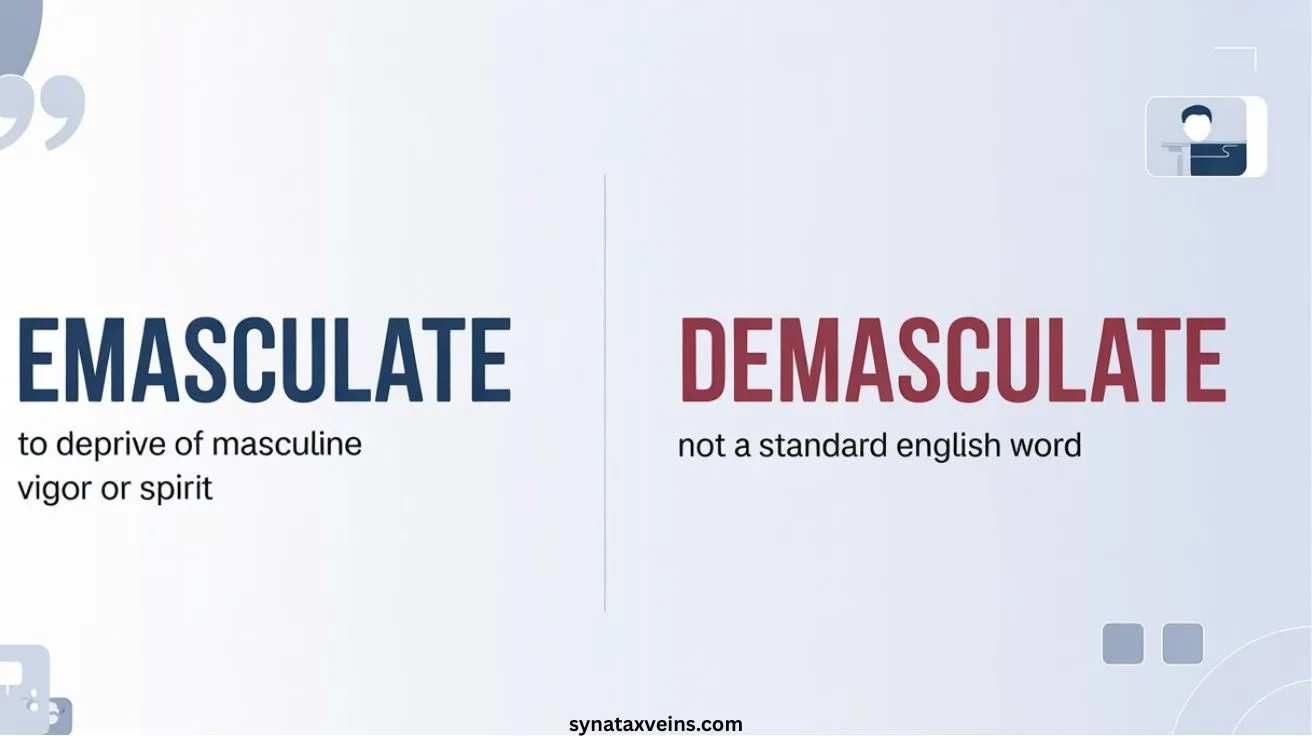Emasculate vs demasculate two words that sound nearly identical, yet behind the similarity hides a crucial difference in correctness, usage and acceptance. In this article we’ll dive into what each term means (or doesn’t mean), explore proper usage, look at real-life examples, and give you the confidence to choose the right one in your writing.
Whether you’re an author, student, or professional communicator, understanding this subtle nuance can elevate your writing and avoid a common grammar trap.
Definition and Meaning of Emasculate
The word emasculate may sound intense, but it simply refers to making someone or something weaker or less powerful. In everyday language, it’s often used to describe situations where a man feels his strength, confidence, or role has been reduced.
whether emotionally, socially, or physically. The term can also apply beyond people, describing anything that loses its effectiveness or power.
Literal Meaning
The verb emasculate comes from Latin emasculare: e- (“out of” or “remove”) + masculus (“male”). In its earliest sense it meant to remove the male organs (or literal masculinity).
Figurative Meaning
Over time, embryonic usage broadened. Today, when you deal with emasculate meaning, you often see it used figuratively: to weaken or deprive someone or something of strength, vigor or masculine qualities. For example:
“Critics argued that the amendment would emasculate the law.”
In the botanical context, it means removing the male parts (androecium) of a flower in plant-breeding.
Takeaways for writers:
- Use emasculate when you want to describe weakening, depriving, or reducing strength/masculinity.
- It works in both literal and figurative senses.
- Examples help clarify the meaning.
Definition and Meaning of Demasculate
The term demasculate means to strip away or weaken someone’s masculinity, strength, or confidence. It’s often used when describing situations where a person, usually a man, feels belittled or loses authority or dominance.
While similar to emasculate, demasculate is less common and often carries a stronger emotional tone, emphasizing a loss of identity or power.
Word Origin and Status
At a glance, demasculate seems logical: the prefix de- often signals removal or reversal. Many writers ask “is demasculate a word?” The answer: it exists, but not as a standard, dictionary-approved English word. Because emasculate already covered the sense of “removing masculinity” long ago, demasculate never gained strong currency or formal recognition.
Usage Notes
If you do encounter demasculate, it’s typically in informal, rhetorical or even error-driven usage:
“The system seemed designed to demasculate innovation.” (non-standard)
Important: For formal writing, professional communication and most academic contexts you should avoid demasculate. Stick with emasculate.
READ MORE >>> Igniter or Ignitor: Which Spelling Is Right and Why It Matters
Emasculate vs Demasculate: Key Differences
Here’s a comparison table summarizing the differences:
| Feature | Emasculate | Demasculate |
| Dictionary status | Standard & widely recognised. | Non-standard, rare usage. |
| Meaning | To weaken, deprive of strength, castrate or reduce vigor. | Intended meaning: similar, but lacks authority. |
| Usage in writing | Correct for formal/informal, literal/figurative contexts. | Best avoided in formal contexts; may appear in informal speech. |
| Word origin | Latin e- (“out of”) + masculus (“male”). | Built with de- prefix + masculine root; but not established. |
| Example | “He felt emasculated after losing the promotion.” | “The speech demasculated his reputation.” (incorrect usage) |
Why this matters: Writers often struggle because of the de- prefix pattern in English (e.g., deactivate, demote, deconstruct). Since emasculate already carries the correct meaning, demasculate ends up being redundant or confusing.
Usage of Emasculate in Different Contexts
The word emasculate isn’t limited to just one situation—it’s surprisingly versatile. Depending on the context, it can describe physical weakness, emotional loss of confidence, or even a decline in power or effectiveness. From literature and relationships to politics and social commentary, emasculate appears in many forms of expression.
Figurative & Social Usage
You’ll see emasculate used when someone feels deprived of traditional masculine authority or confidence:
- “Some men feel emasculated working under a female boss.”
- “The public critique emasculated his credibility and self-esteem.”
Professional or Political Usage
It frequently appears in commentary about weakening institutions or authority:
“The amendment emasculates the legislation and makes enforcement impossible.”
Botanical Usage
In plant breeding, emasculate means removing the male parts of a flower so that it doesn’t self-pollinate.
“For cross-pollination, the botanist emasculated the flower.”
These varied usages highlight the richness of emasculate—both literal and figurative—making it a versatile term in English.
Summary Table for Quick Readers
| Term | Correctness | Meaning | Usage Example |
| Emasculate | ✅ Correct | To deprive of strength or masculine qualities | “The decision emasculated the organization.” |
| Demasculate | ❌ Non-standard | Intended as “remove masculinity” but lacks recognition | “Avoid using demasculate in formal writing.” |
Synonyms & Antonyms of Emasculate
Synonyms (useful when you want variety or avoid gendered connotations):
- weaken, undermine, disempower, debilitate, enfeeble
Antonyms (for opposite meaning):
- empower, strengthen, fortify, invigorate
Note: If you’re concerned about tone or gender implications, consider using a synonym instead of emasculate. For example, “undermine” or “weaken” can deliver the same idea without the gendered nuance.
Common Mistakes & How to Avoid Them
Many writers make these mis-steps:
- ✅ Confusing emasculate with demasculate.
- ✅ Using emasculate incorrectly in highly sensitive gendered contexts without nuance.
- ✅ Relying on demasculate in formal writing (avoid it!).
Quick fixes:
- If you mean “weaken, deprive of masculinity or strength,” use emasculate.
- If you’re unsure about gender implications, switch to a neutral synonym like “weaken” or “undermine.”
- Avoid demasculate unless you’re quoting informal speech or deliberate style.
Cultural & Linguistic Nuances
In modern discourse, the word emasculate touches on themes of masculinity, power, identity and social expectations. Some key points to consider:
- Even though emasculate originally focused on male identity, its figurative usage applies broadly (to any person or institution).
- Because it evokes male/feminine binaries, thoughtful writers may choose alternatives to avoid unintended connotations.
- Awareness of tone is key: using emasculate to describe gendered power dynamics requires sensitivity.
Historical and Etymological Insights
Here’s a brief etymology snapshot:
- Emasculate: First recorded in English around 1607.
- Latin emasculatus, past participle of emasculare.
- Demasculate: Has no clear historical lineage in major dictionaries; enters usage mostly via informal/online contexts.
The reason the English language never embraced demasculate lies partly in how emasculate already filled the need both literally and figuratively.
FAQs About Emasculate vs Demasculate
Is “demasculate” a real word?
It appears in some dictionaries (e.g., Wiktionary) as “to remove masculinity,” but major style guides and dictionaries label it as non-standard.
Can “emasculate” be used for both men and women?
Yes. While it originates from male-related roots, the figurative sense of “depriving of strength or effectiveness” works for any person or thing.
What is the opposite of “emasculate”?
Opposites include words like empower, strengthen, fortify. Some discussion boards propose neologisms like remasculate, but these aren’t standard.
What’s the difference between emasculate vs castrate?
Castrate is often used in the physical/biological sense (removal of testicles). Emasculate can be literal but most often figurative (loss of power or confidence).
Should I use “demasculate” in academic or formal writing?
It’s best to avoid it. Use emasculate for clarity, accuracy and professionalism.
Conclusion
To wrap up: if you ever hesitate between emasculate vs demasculate, remember this: choose emasculate. It’s the dictionary-approved term that covers everything from literal removal of masculinity to figurative sense of weakening, and it’s accepted in formal, professional and academic writing. Demasculate, on the other hand, remains a non-standard variant. Use it only with awareness—or better yet, avoid it altogether.
By using the right word and understanding its implications, you enhance clarity, precision and authority in your writing. Go ahead and master emasculate—and confidently steer clear of demasculate.
Confused between emasculate and demasculate? Discover their meanings, correct usage, key differences, and examples to avoid this common mistake

